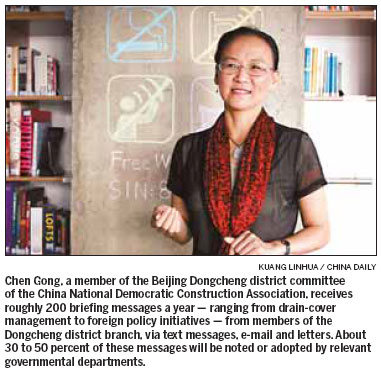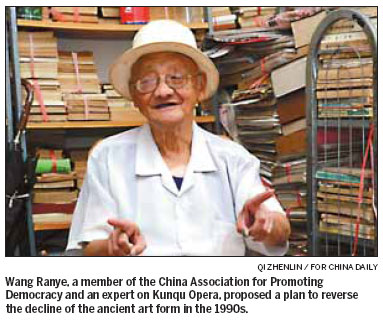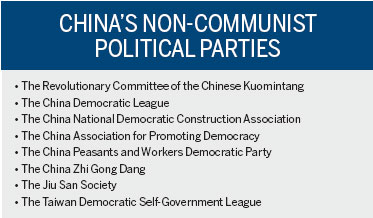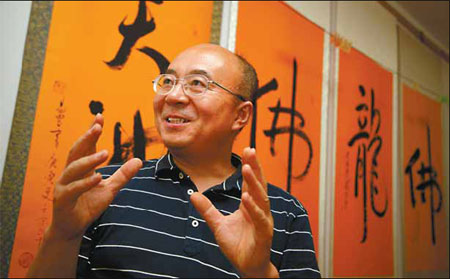Consultation and partnership increase government efficiency
Updated: 2012-09-04 08:08
By Peng Yining (China Daily)
|
||||||||

|
In the past 15 years, Zhang Xuedong, a member of the central committee of the Jiu San Society - one of eight non-communist parties active in China - has made 23 proposals, most of which have been acknowledged by the government. Non-communist parties have more than 700,000 members in total, dotted around both urban and rural areas and drawn from a variety of ethnic groups. Kuang Linhua / China Daily |



As the 18th National Congress of the Communist Party of China draws near, Peng Yining explains how the CPC and other political parties interact ahead of the country's most important political event.
Following a high-pitched beep, a text message popped up on the screen of Chen Gong's cellphone. It was a briefing message about safety management of the manhole covers that litter Beijing's streets, to ensure that residents avoid injury caused by broken or loose-fitting covers.
Chen, a member of the Beijing Dongcheng district committee of the China National Democratic Construction Association - one of eight non-communist parties active in the country - said the message would be passed on to a higher level of the CNDCA and then to the United Front Work Department of Communist Party of China Central Committee. Finally, it would be brought to the attention of a related governmental department, probably the Beijing Municipal Commission of City Administration and Environment.
Chen said she receives roughly 200 briefing messages a year - ranging in scope from simple drain-cover management to complex foreign policy initiatives - from 1,500 members of the Dongcheng district branch, via text messages, e-mail and letters.
She said 30 to 50 percent of these messages will be noted or adopted by relevant governmental departments. In addition, the district's CNDCA committee presents five proposals annually to the Chinese People's Political Consultative Conference at city level.
"I am only talking about messages from one party branch in one district," said Chen. "Imagine how many pieces of advice are proposed and adopted all over China every year. These are informed opinions and should never be underestimated."
Last year a proposal from Chen, about the development of Beijing's culture industry, was adopted and overseen directly by the mayor.
Non-communist parties and politicians without party affiliation play a large role in political consultation and the democratic supervision of State affairs.
Canvassing views
Political consultation is an indispensable procedure in every significant decision made by the Communist Party of China. The government canvasses the views of non-communist parties and independent politicians, including their opinions in the decision-making process, to ensure the correct decisions are made and to promote efficiency.
Through the use of proposals and symposiums, non-communist politicians participate in almost every branch of national affairs, including the economy, education, social security and foreign policy. The various levels of the CPC and the government are required to respond to the submissions of the panel.
"In the past five years, President Hu has personally hosted five or six sessions with non-communist representatives annually, to discuss major national issues," said Yan Junqi, who has participated in the sessions with Hu Jintao since 2007. Yan is president of the China Association for Promoting Democracy, a political party mainly peopled by intellectuals in the fields of education, culture and publishing.
In order to comment on State affairs and provide advice or criticism, representatives have to conduct in-depth research, including fieldwork and brainstorming sessions with members of the China Association for Promoting Democracy, before each session.
"We are happy that our advice is often acknowledged and adopted," she said. "That allows us to fulfill our duty as party participating in State affairs."
Of course, not every piece of advice will be adopted, but openness and an awareness of wide-ranging opinions are essential, according to Zhang Xuedong, a member of the central committee of the Jiu San Society, another of China's non-communist parties.
"The government is open to the advice it requests before making significant decisions. Those decisions could be made simply by administrative order," said Zhang. "Our input certainly helps them make the right decisions and also allows people outside the CPC to feel respected."
In the past 15 years, Zhang has made 23 proposals, most of which were acknowledged by the government.
In the 1990s, Zhang and other leaders of the Jiu San Society once spent an entire year conducting research into agricultural development in Beijing and provided advice to the municipal government, according to Zhang. Led by their party president, members traveled to Beijing's agriculture bases in the suburbs almost every weekend.
"Proposals have to be deep, rich and insightful, otherwise they won't be adopted," said Zhang, who also attends consulting sessions held at various levels of government, four to five times a year.
Last year, the city of Taiyuan, in Shanxi province, proposed building a theme park featuring miniatures of famous Chinese landmarks to boost tourism. The local authorities invited Zhang, a former engineer, and experts from other non-communist parties to evaluate the feasibility of the project.
Zhang was not impressed: "Who would go to see a fake Great Wall if he were able to travel to see the real one?" he asked. The experts dismissed the project as impractical, but that needed to be communicated with great subtlety, he said.
"If you simply dismiss a project without giving any solid reason, your advice can be easily overlooked," he said.
To persuade the local government to reject the project, Zhang and other members of panel collated examples of the failure of similar theme parks, both in China and overseas, and instead produced an alternative proposal to clean up a polluted river to build a nature reserve.
"We played our presentation to the mayor slide by slide," he recalled. "And finally, the proposed theme park was rejected. In another case, a village administration wanted to build a 50-story apartment block, because they thought that "tall buildings are the symbol of modernization". However, the cost of the project far outstripped the annual gross domestic product of the village, according to Zhang.
"We suggested that the head of the village held a public poll on the idea. The result showed that 90 percent of residents were opposed to the plan and the project was subsequently cancelled," he said.
He said the advice offered must be professional and practical, but not extreme. One proposal from a Jiu San Society member was that medical staff nationwide should be discharged if they made any mistakes.
"Some people might applaud that proposal because it takes the side of patients, but it's neither fair nor reasonable," he said. "It shouldn't, and won't, be adopted."
Relevant expertise
Political consultancy work requires a deep understanding of conditions in the relevant fields, which is why most of those who participate in the political process are high-level intellectuals, said Chen.
Taking the China National Democratic Construction Association as an example, Chen said the recruitment of members is strict. Applicants need to be proposed by at least two current members and face a wait of at least six months to see if they have gained admission.
"Most CNDCA members are well-educated, accomplished business executives," she said. "We need people who have the ability to solve major problems."
Wang Ranye, 85, joined the China Association for Promoting Democracy in the 1980s. As an expert on Kunqu Opera, one of China's most ancient art forms, Wang proposed a plan to reverse its decline in the 1990s.
"With the help of professionals, the administrators are able to do their work better and more effectively," he said.
China's eight non-communist parties have more than 700,000 members in total, dotted around both urban and rural areas and drawn from a variety of ethnic groups. As a result, their opinions have a wide geographical spread and address issues from all walks of life.
"I report every problem I find, including broken lamps in the library," said China Democratic League member Lei Pingtian, 76, a retired college teacher from Chongqing. "For the government, there are always some blind spots that could affect people's lives, and our job is to help fill in those blanks."
Although the process of political consultancy has worked well so far, the system could also be improved to be relevant to modern times, according to Zhang.
To provide a higher degree of practical advice, the public should have greater access to information, including the process of governmental decision-making, he said.
"Let us know more about what's going on and we will be able to provide more help."
Contact the writer at pengyining@chinadaily.com.cn

 Relief reaches isolated village
Relief reaches isolated village
 Rainfall poses new threats to quake-hit region
Rainfall poses new threats to quake-hit region
 Funerals begin for Boston bombing victims
Funerals begin for Boston bombing victims
 Quake takeaway from China's Air Force
Quake takeaway from China's Air Force
 Obama celebrates young inventors at science fair
Obama celebrates young inventors at science fair
 Earth Day marked around the world
Earth Day marked around the world
 Volunteer team helping students find sense of normalcy
Volunteer team helping students find sense of normalcy
 Ethnic groups quick to join rescue efforts
Ethnic groups quick to join rescue efforts
Most Viewed
Editor's Picks

|

|

|

|

|

|
Today's Top News
Health new priority for quake zone
Xi meets US top military officer
Japan's boats driven out of Diaoyu
China mulls online shopping legislation
Bird flu death toll rises to 22
Putin appoints new ambassador to China
Japanese ships blocked from Diaoyu Islands
Inspired by Guan, more Chinese pick up golf
US Weekly

|

|







